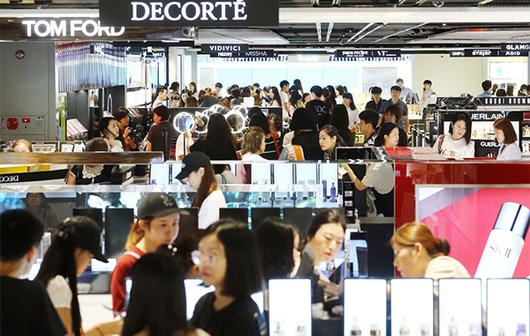 |
<이미지를 클릭하시면 크게 보실 수 있습니다> |
Amid the widening anti-Japanese sentiment in South Korea following Tokyo’s retaliatory trade restrictions, Japanese cosmetics have become a new target of Korean consumers’ Japanese product boycott campaign with their sales rapidly falling this month.
According to sources from the retail industry on Sunday, sales of Japan’s premium skin care brand SK-Ⅱ plunged 23 percent from July 1 to 25 from the same period last year at a local department store, with those of Shiseido falling 21 percent and Shu Uemura 15 percent. The cosmetics labels were similarly hit at another department store chains across the nation, with sales dropping 20 percent on average.
As the consumer boycott against Japanese brands is building up, some consumers even asked for putting the Japanese beauty products they shopped in a bag that doesn’t carry the brand label, an official from a department store said. Some Japanese cosmetics brands are reportedly mulling removing advertising boards at stores to hide the national identity of the brands, according to sources.
Cosmetics products have recently joined the list of Japanese products that Korean consumers try to shun amid growing anger over the Japanese government that has restricted shipments to Korea of three key materials used in manufacturing chips and displays since July 4 citing security reasons. But Seoul believes the measure is part of Tokyo’s retaliatory action against Korean court’s rulings ordering Japanese firms to compensate for Koreans forced to work during World War Ⅱ.
The action has quickly triggered anti-Japanese sentiment in Korea and led to voluntary boycott movement against all Japanese products ranging from beers and clothing to cars and traveling to Japan. Sales of Japanese beers at the nation’s major retailer E-Mart plunged 48.1 percent from July 1 to 25 from a year ago, and those of Japanese instant noodle products fell 33.1 percent and snacks 29 percent. As consumers are replacing the brands with Korean ones, sales of Korean beers rose 8.1 percent over the same period.
[ⓒ Maeil Business Newspaper & mk.co.kr, All rights reserved]
이 기사의 카테고리는 언론사의 분류를 따릅니다.
기사가 속한 카테고리는 언론사가 분류합니다.
언론사는 한 기사를 두 개 이상의 카테고리로 분류할 수 있습니다.
언론사는 한 기사를 두 개 이상의 카테고리로 분류할 수 있습니다.


